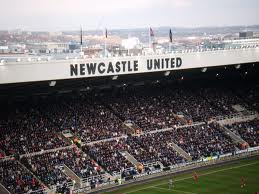By David Owen
April 14 – A sharp cut in payroll costs was at the heart of Newcastle United’s impressive financial performance in 2014-15, with the wages and salaries bill tumbling below £57 million from £69.3 million the previous year.
The Tyneside club, which is in imminent danger of relegation from the Premier League, announced a 73% upsurge in after-tax profit last week. Its accounts have now been published by Companies House, permitting a more thorough analysis.
Though the number of commercial staff employed in the year under review was cut significantly from 54 to 35, playing squad/team management numbers fell only marginally from 133 to 128.
The club said the reduction in payroll costs “principally reflects both the absence of bonus payments this year and the cost and timing in the prior year of some significant changes to the playing and development squad”.
It said the wage bill and wages:turnover ratio would rise in 2015-16. Subsequent to the balance-sheet date, the club had committed to a further net spend of some £80 million on additions to the playing squad.
The new figures also reveal that profit on player and staff disposals climbed to £17.1 million in the year to 30 June 2015 from £14 million a year earlier. Full-back Mathieu Debuchy was among those who left, joining Arsenal in July 2014.
Pre-tax profits for 2014-15 reached £36.1 million – the second-highest figure to date registered for this period in the Premier League.
The squeeze on payroll costs did not extend to directors’ remuneration. “Aggregate remuneration in respect of qualifying services” rose from £189,771 in 2013-14 to £247,065 a year later, while aggregate remuneration of the highest-paid director in 2014-15 was £150,000, up from £106,793. While L.Charnley is listed as the only director of the company, Newcastle United Limited, J.A.Irving also held office during the year, resigning on 1 July 2015.
Charitable donations were cut from £39,995 in 2014 to £4,240. The accounts indicate that the company paid £190,000 to its auditors in 2014-15, up from £126,000 the previous year, with the increase attributable to fees receivable for “tax and other advisory services”.
Contact the writer of this story at moc.l1714393155labto1714393155ofdlr1714393155owedi1714393155sni@n1714393155ewo.d1714393155ivad1714393155

